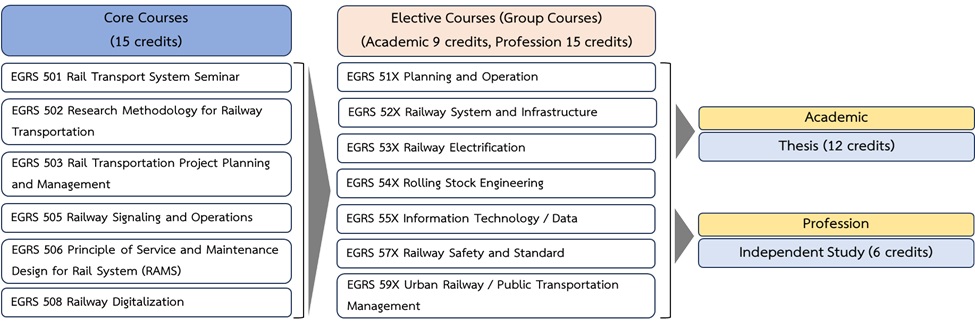Curriculum
Curriculum option at the major level (‘academic program’ and ‘professional program’)
In the program, students can select between two distinct pathways: the Academic Plan or the Profession Plan. Both pathways are designed to equip students with comprehensive knowledge and skills in railway engineering, but their focus and structure differ. Despite the different approaches in the Academic and Professional Programs, all students achieve mastery in all ELOs by the end of their studies. The Academic Program's focus on research and the Professional Program's emphasis on practical application ensure that graduates are well-prepared for their respective career paths, whether in academia, research, or professional practice. Table 1 compares the differences between these study pathways.
Table 1 compares the difference between Academic and Professional Programs
| Program Elements | Academic | Profession |
| Focus | The Academic Program is research-oriented and emphasizes the development of in-depth academic knowledge and research skills. | The Professional Program is practice-oriented and emphasizes practical skills and professional competencies. |
| Coursework | Students in the Academic Program have a reduced coursework load compared to the Professional Program, allowing them to dedicate more time to their research. | Students in the Professional Program undertake more coursework, which includes practical and applied subjects relevant to the railway industry. |
| Thesis/ Independent Study | A significant component of the Academic Program is the completion of a thesis. The thesis involves original research and contributes to the academic body of knowledge in railway engineering. | Instead of a thesis, students complete an independent study project. This project focuses on solving real-world problems and applying theoretical knowledge in practical settings. |
| Objective |
This program is ideal for students who aspire to pursue academic careers, research institutions, or advanced technical roles requiring strong research capabilities. |
This program is designed for students who aim to enter the workforce directly after graduation, particularly in roles that require practical problem-solving skills and hands-on experience in railway engineering. |
Table 2 presents the elective course requirements for students on the academic and professional plans. Students on the academic plan will have to take nine credits for their elective while concentrating more work on their thesis. On the other hand, students on the professional plan will have to take 15 credits (2 more courses compared to the academic plan). Figure 1 presents the curriculum options of students in the railway transportation system program.
Table 2 Curriculum Structure
| Course | Academic Plan | Profession Plan |
| 1) Mandatory Courses | 15 credits | 15 credits |
| 2) Elective Courses (no less than) | 9 credits | 15 credits |
| 3) Thesis | 12 credits | - |
| 4) Independent Study | - | 6 credits |
| Total (not less than) | 36 credits | 36 credits |












